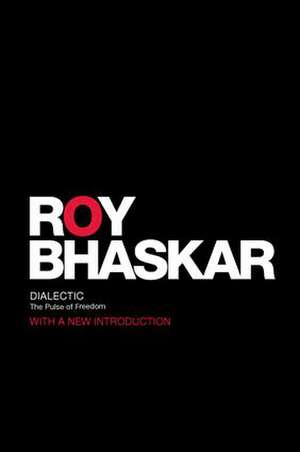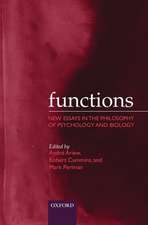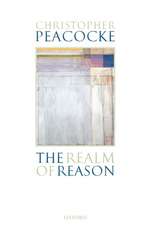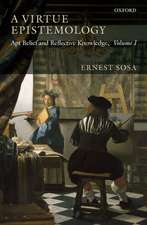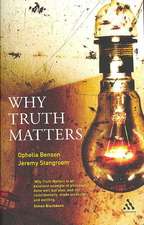Dialectic: The Pulse of Freedom: Classical Texts in Critical Realism (Routledge Critical Realism)
Autor Roy Bhaskaren Limba Engleză Hardback – 15 apr 2016
The first chapter clarifies the rational core of Hegelian dialectic. Chapter two then proceeds to develop a general theory of dialectic. Isolating the fallacy of 'ontological monovalence', Roy Bhaskar then shows how absence and other negating concepts such as contradiction have a legitimate and necessary ontological employment. He then goes on to give a synoptic account of key dialectical concepts such as the concrete universal; to sketch the further dialectical development of critical naturalism through an account of what he calls four-planar social being; and following consideration of the dialectical critique of analytical reason, he moves on to the real definition of dialectic as absenting absence and in the human sphere, the axiology of freedom.
Chapter three extends and deepens critical realism’s characteristic concerns with ontology, science, social science and emancipation not only into the realms of negativity and totality, but also into the fields of reference and truth, spatio-temporality, tense and process, the logic of dialectical universalizability and on to the plane of ethics, where it articulates a combination of moral realism and ethical naturalism, whereby consideration of elemental desire involves commitment to the eudaimonistic society. This is then followed by a sublime discussion of key moments in the trajectory of Western philosophy, the tradition of which can now be seen to be based on what the author calls the unholy trinity of the epistemic fallacy or the reduction of being to knowledge, primal squeeze or the collapse of structure and alethic truth, and ontological monovalence.
| Toate formatele și edițiile | Preț | Express |
|---|---|---|
| Paperback (2) | 306.06 lei 3-5 săpt. | |
| PENGUIN RANDOM HOUSE LLC – 17 noi 1994 | 306.06 lei 3-5 săpt. | |
| Taylor & Francis – iul 2008 | 402.43 lei 3-5 săpt. | +31.39 lei 6-10 zile |
| Hardback (1) | 1000.27 lei 6-8 săpt. | |
| Taylor & Francis – 15 apr 2016 | 1000.27 lei 6-8 săpt. |
Din seria Classical Texts in Critical Realism (Routledge Critical Realism)
-
 Preț: 402.43 lei
Preț: 402.43 lei -
 Preț: 333.14 lei
Preț: 333.14 lei -
 Preț: 450.40 lei
Preț: 450.40 lei -
 Preț: 413.33 lei
Preț: 413.33 lei -
 Preț: 413.33 lei
Preț: 413.33 lei -
 Preț: 369.18 lei
Preț: 369.18 lei -
 Preț: 371.68 lei
Preț: 371.68 lei -
 Preț: 452.31 lei
Preț: 452.31 lei - 15%
 Preț: 279.39 lei
Preț: 279.39 lei -
 Preț: 408.74 lei
Preț: 408.74 lei
Preț: 1000.27 lei
Preț vechi: 1219.84 lei
-18% Nou
Puncte Express: 1500
Preț estimativ în valută:
191.42€ • 207.86$ • 160.80£
191.42€ • 207.86$ • 160.80£
Carte tipărită la comandă
Livrare economică 23 aprilie-07 mai
Preluare comenzi: 021 569.72.76
Specificații
ISBN-13: 9781138140691
ISBN-10: 1138140694
Pagini: 454
Ilustrații: 70
Dimensiuni: 156 x 234 mm
Greutate: 0.81 kg
Ediția:1
Editura: Taylor & Francis
Colecția Routledge
Seria Classical Texts in Critical Realism (Routledge Critical Realism)
Locul publicării:Oxford, United Kingdom
ISBN-10: 1138140694
Pagini: 454
Ilustrații: 70
Dimensiuni: 156 x 234 mm
Greutate: 0.81 kg
Ediția:1
Editura: Taylor & Francis
Colecția Routledge
Seria Classical Texts in Critical Realism (Routledge Critical Realism)
Locul publicării:Oxford, United Kingdom
Public țintă
UndergraduateNotă biografică
Roy Bhaskar is the originator of the philosophy of critical realism, and the author of many acclaimed and influential works including A Realist Theory of Science, The Possibility of Naturalism, Scientific Realism and Human Emancipation, Reclaiming Reality and Dialectic: The Pulse of Freedom. He is an editor of the recently published Critical Realism: Essential Readings and is currently chair of the Centre for Critical Realism.
Recenzii
"Bhaskar goes back to the beginning of the Western philosophical quest and offers a brilliant refashioning of the dialectic. Because his ‘dialectical critical realism’ is systematic, ontologically sustained and self-consciously ethical and political, he is able to give stunning readings of key chapters in the history of philosophy. This is a unique book full of gems." – Peter Manicas
"In this stunning book, Roy Bhaskar develops his own programme of critical realism into a radically new and original theory of dialectics and a critique of previous theories from the ancient Greeks to twentieth century neo-Marxism. The result is comparable in its scope and ambition to Sartre’s critique of dialectical reasoning. It is hard to think of any other contemporary philosopher with the powers to bring this off." – William Outhwaite
"I deeply admire its vast range, rigour and originality . . . a massively important work." –Terry Eagleton
'...stunning readings of key chapters in the history of philosophy. This is a unique book full of gems.' – Peter Manicas
'In this stunning book, Roy Bhaskar develops his own programme of critical realism into a radically new and original theory of dialectics and a critique of previous theories from the ancient Greeks to twentieth century neo-Marxism. The result is comparable in its scope and ambition to Sartre’s critique of dialectical reasoning. It is hard to think of any other contemporary philosopher with the powers to bring this off.' – William Outhwaite
'I deeply admire its vast range, rigour and originality... a massively important work.' - Terry Eagleton
"In this stunning book, Roy Bhaskar develops his own programme of critical realism into a radically new and original theory of dialectics and a critique of previous theories from the ancient Greeks to twentieth century neo-Marxism. The result is comparable in its scope and ambition to Sartre’s critique of dialectical reasoning. It is hard to think of any other contemporary philosopher with the powers to bring this off." – William Outhwaite
"I deeply admire its vast range, rigour and originality . . . a massively important work." –Terry Eagleton
'...stunning readings of key chapters in the history of philosophy. This is a unique book full of gems.' – Peter Manicas
'In this stunning book, Roy Bhaskar develops his own programme of critical realism into a radically new and original theory of dialectics and a critique of previous theories from the ancient Greeks to twentieth century neo-Marxism. The result is comparable in its scope and ambition to Sartre’s critique of dialectical reasoning. It is hard to think of any other contemporary philosopher with the powers to bring this off.' – William Outhwaite
'I deeply admire its vast range, rigour and originality... a massively important work.' - Terry Eagleton
Cuprins
Contents Preface Preface to the Second Edition Inroduction Chapter 1. Philosophy and Scientific Realism 1. Two Sides of Knowledge 2. Three Traditions in the Philosophy of Science 3. The Transcendental Analysis of Experience a. The Analysis of Perception b. The Analysis of Experimental Activity 4. The Status of Ontology and Its Dissolution in Classical Philosophy 5. Ontology Vindicated and The Real Basis of Causal Laws 6. A Sketch of a Critique of Empirical Realism Chapter 2. Actualism and the Concept of a Closure 1. Introduction: On the Actuality of the Causal Connection 2. Regularity Determinism and the Quest for a Closure 3. The Classical Paradigm of Action 4. Actualism and Transcendental Realism: The Interpretation of Normic Statements 5. Autonomy and Reduction 6. Explanation in Open Systems Appendix. Orthodox Philosophy of Science and the Implications of Open Systems Chapter 3. the Logic of Scientific Discovery 1. Introduction: On the Contingency of the Causal Connection 2. The Surplus-Element in the Analysis of Law-like Statements: A Critique of the Theory of Models 3. Natural Necessity And Natural Kinds: The Stratification of Nature and The Stratification of Science 4. The Social Production of Knowledge by Means of Knowledge 5. Objections to the Account of Natural Necessity Proposed 6. The Problem of Induction Appendix. Natural Tendencies and Causal Powers Chapter 4. Metaphysics and the Philosophy of Science Postscript to the Second Edition Bibliography Index of Names Index of Subjects
Descriere
Dialectic: The Pulse of Freedom is now widely regarded as a classic of contemporary philosophy. Written by the renowned founder of the philosophy of critical realism, first published in 1993, this book sets itself three main aims: the development of a general theory of dialectic – of which Hegelian dialectic can be seen to be a special case; the dialectical enrichment and deepening of critical realism – into the system of dialectical critical realism; and the outline of the elements of a totalizing critique of Western philosophy.
